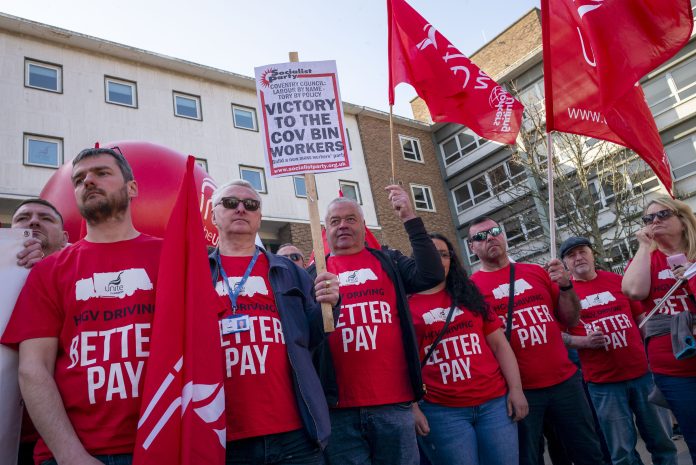Editorial – The Socialist Issue 1177
Boris Johnson hoped that scuttling away to India would distract from his escalating problems at home – it didn’t.
Threatening to send vulnerable refugees who have suffered torture and political persecution to Rwanda – a country accused of torture and political persecution – won’t either. Nor will a new battle with the EU over the Brexit Irish protocol.
Mounting anger over the lies and hypocrisy of partygate, combined with the devastating cost-of-living crisis, means Johnson’s personal approval rating is minus 26. The Tories are bracing themselves for setbacks in the local elections, despite lack of enthusiasm for Starmer’s Labour.
Tory MPs are sharpening their knives: it’s just a case of when they will be plunged into Johnson’s back. Most likely after the May elections.
The Tories have no agreed successor to Johnson. But one former cabinet minister was quoted as saying that “a broomstick would be better” than what they have now – such is their desperation.
They have no single candidate because the Tory party, while ultimately representing the rich and powerful, is an amalgam of irreconcilable factions, divided on how best to offload the crisis onto working-class people.
Tory glue
The main divide is between the neo-Thatcherites like Rishi Sunak, who want to boost big business profits by reducing the role of the state, and the red wall Tory MPs who, while also supporting Thatcher’s ‘small state’ ideas, want at least some crumbs thrown to the people who ‘lent’ the Tories their vote in the last election and are now taking them back.
‘Election winner’ Johnson was the ‘glue’ temporarily holding the factions together.
But with him seemingly on his way out, the warring will intensify. As will the cost-of-living crisis which none of the factions have an answer to.
According to the IMF, the British economy will be the worst of the G7 in the next year, and the country in which inflation will take the longest to fall. Consumer confidence is at a 14-year low as people cut back on spending in the face of rocketing prices.
Starmer’s Labour offers no alternative to the floundering Tories as far as working-class people are concerned. Its pledge to ‘balance the books’ will mean more cuts and austerity, and no relief for those struggling to pay the bills and put food on the table.
Starmer has ditched Jeremy Corbyn’s promise to nationalise the energy companies, which would be the first step needed to bring down the astronomical price hikes.
In this crisis situation, working-class people need two main things: combative trade union leaders that can fight for the wage and benefit rises necessary to keep our heads above water, and a new party that represents the interests of workers, young people and pensioners in opposition to the pro-capitalist policies of the main establishment parties.
We need a party that has a vision of a different way of organising society – taking the wealth out of the hands of the super-rich and planning the economy under the democratic control of working people – and is prepared to organise to fight for it on a mass scale.
By standing workers’ candidates in the May elections, as part of the Trade Unionist and Socialist Coalition, we are showing on a small scale that a political alternative for working-class people can be built.
New mass workers’ party
Trade unions are coming into increasingly sharp conflict with Labour, like in Coventry where bin workers in Unite are striking against a vicious Labour council refusing to pay them a decent living wage. If these workers and unions, alongside the unions that have already broken from Labour – like the baker’s union BFAWU and transport workers’ union RMT – were to stand candidates on a much wider scale, the basis for a new mass workers’ party could be laid.
At the same time, an immediate task is to organise to make sure that the national demonstration which, under pressure, the Trades Union Congress has called for 18 June, is built for. It must become a platform to unite the anger of working-class people and coordinate strike action for higher wages against the attacks of the Tories and the bosses.







